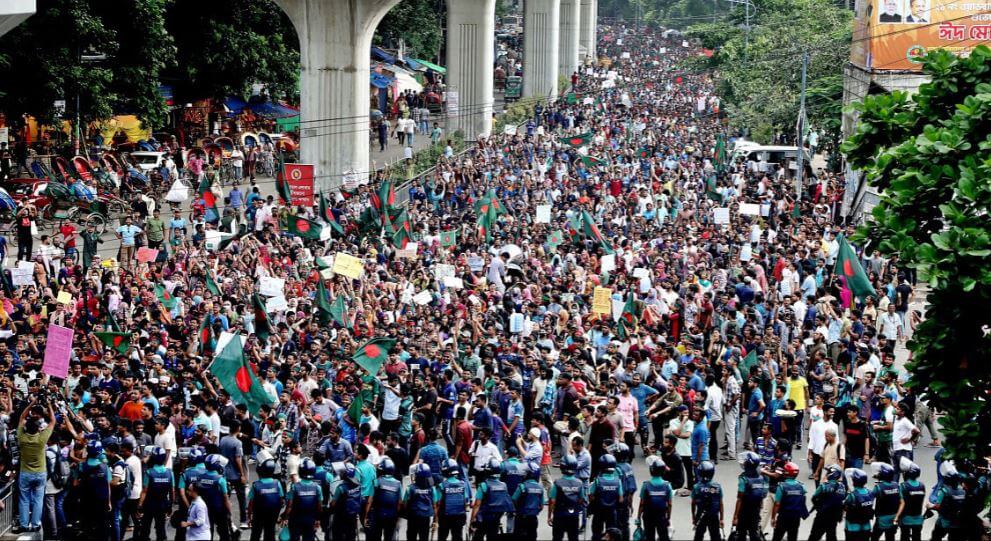Quota Protest 2024: An Entity Showing Serious Cracks
Zillur Rahman | 29 July 2024
It began as a simple protest: reform the government job quota system—a basic demand arising from a fundamental problem. Young people in Bangladesh are facing unprecedented levels of unemployment, while reports from February indicated that more than a quarter of the 1.9 million government job seats remained vacant. Adding fuel to the fire was a controversial high court verdict to restore the highly unpopular 56 percent job reservation system. Thus, you have the recipe for a massive nationwide student mobilisation demanding a solution to a broken system.
The answer to this growing unrest was simple. The government is no stranger to angry students on the streets. Whether that be the earlier road safety movement, the movement opposing VAT on private universities, or the previous movements against the quota, the answer was always the same—clear and non-antagonistic channels for dialogue. Who could have guessed that the government could fumble the ball so hard? Who would have imagined that such a simple demand would end up with the blood of hundreds on the streets?
After the internet ban was lifted, the images of horror that filled our social media feed seemed to be straight out of some war movie. Helicopters performing strafing runs, shooting sound grenades at crowds of people. Tanks rolling past burnt-out remains of vehicles. Security forces clearly using lethal weapons against unarmed protesters. And scores and scores of other atrocities, too numerous to list. Accounts and websites have been created solely to document and preserve these recorded atrocities. These resources are a mere Google search away for anyone who needs a quick, sobering dose of reality. At the time of writing, the number of dead is over 200, according to what some media outlets could verify. Who knows what the real count will turn out to be. But that is not all. Nearly five thousand have been arrested in over a week. Mothers and fathers helplessly roaming hospitals to find their missing children. Emotional eulogies of brothers and sisters who have been martyred in the violence. These are the images that will be burnt into the collective psyche of our nation. There will be no cover-up. We will not forget.
This monumental failure of the government to control the situation cannot simply be analysed as a monolith. If we peel back the surface of this failure, we see the incompetence, arrogance, and ineptitude unfurl like some kind of rotten onion. The first fumble was a remark by the prime minister, indirectly implicating all students asking for quota reforms as having some link with "razakar". The second fumble was the letting loose of the goons of student and youth wing of the ruling party, who then proceeded to turn a non-violent movement into one of needless violence. And the final fumble was the complete shutdown of the internet in Bangladesh, decimating Bangladesh's already faltering economy, as if to cut off the nose to spite the face.
There are many more layers to this chain of failures. Using tanks, vehicles, and helicopters—few of which were clearly marked with the UN logo—to subjugate the incensed masses. A complete failure to protect the nation's key point installations, such as the BTV building, metro rail station, and BRTA headquarters, etc. A comically weak attempt to convince the population that the internet shutdown was not a clear government overreaction. And a continuous and embarrassing disregard of our leaders for the bloody elephant in the room, which is the pile of dead bodies of our children, our best and brightest, who had to give their lives simply to earn the opportunity for a possible government job.
You know, I know, they know. This was a total and utter mess of an affair. Words simply fall short of describing its magnitude. It is such a mess that perhaps the government might even feel ashamed to admit it. Enemies are being invented out of thin air to justify using the military to quell the unrest. Perhaps if they try hard enough, they might even start to believe the narrative they are spewing. Whatever progressive image the ruling party had tried to build for itself over the last decade or so has been severely fractured. And once the layers of failure are peeled off to expose the rotten core, we are only left with two options: reckless ineptitude or malicious intent. These are the only two cards the government has to play.
There has been an ongoing trend of both the ruling party and the opposition to regard the government as some kind of omnipotent political entity capable of exercising incredible amounts of control over its population with the aid of foreign surveillance technology. Clearly, this has not worked. All it took to shut down Bangladesh's digital infrastructure was one building fire in the capital and a cut wire. Or perhaps the true mechanism of control was never sophisticated intelligence apparatus or assistance from foreign powers. The government has so far solved all its problems through force. Either through official institutions, the student political wing, or security forces in plain clothes, time after time, they have resorted to force their way out of all political hurdles.
However, the key strategic takeaway for the government from all of this should be to take a good, hard look at the means by which they have been ruling so far. Times are changing, and they may realise that the foundation of their rule is not as solid as they might have fooled themselves into believing so far. A closer inspection might reveal the true nature of their political entity. And this entity is now showing serious cracks.
Zillur Rahman is the executive director of the Centre for Governance Studies (CGS) and a television talk show host. His X handle is @zillur
This article was originally published on Daily Star
Views in this article are author’s own and do not necessarily reflect CGS policy.
